Displaying items by tag: Peter Malone's Movie Reviews
Death Race 4: Beyond Anarchy
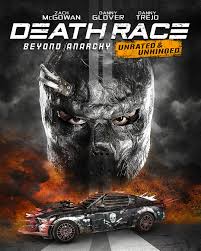
DEATH RACE 4: BEYOND ANARCHY
US, D 18, 109 minutes, Colour.
Zach McGowan, Danny Glover.
Directed by Don Michael Paul.
What happens beyond anarchy? Annihilation? Or, the possibility of salvation?
As can be seen from the title, there have been three Death Race films. They are futuristic, and grim world, fast cars, reckless drivers, injuries and deaths along the route, and champions in an ugly world.
This particular version certainly presents an ugly world, dark, black, a world of the bleakest of territories, prison, with a death races take place. This particular prison is ruled by a warlord, Frankenstein, always masked.
However, there are glimpses of a more ordinary world, fashionable and luxurious living, and the playing of politics and power. And, on the outside of the prison, clubs where bookmakers have contacts with the political world as well is the dark world, would have big betting.
This film is actually won an award – Best stunts. Which means that in its written atmosphere, in the vicious races, drivers both men and women, masked, tattooed, liver… Weapons… Its appeal is to fans of this kind of film. Many audiences will find it far too much.
Eventually, something of the plot does emerge, a champion driver delivered by helicopter along with a female driver, their involvement in the races, confrontation with Frankenstein, and the revelation that the champion driver is actually being parachuted in by the government to defeat Frankenstein and then to be rescued. A lot of the complications with various driver characters, support, betrayals, a seedy club in the hostess in a relationship with the champion, her being taken hostage, to be rescued…
Zach McGowan is the champion and it is a surprise to see Danny Glover in such a prominent role, a controller of the races. And any trio appears as a master bookmaker.
The scenario was written by Tony Julio, a prolific writer of such stories, working with the director, Don Michael Paul, himself an actor and action director. And the collaboration is with British Paul W.S.Anderson who directed the 2008 death race action film.
This is Joan Collins
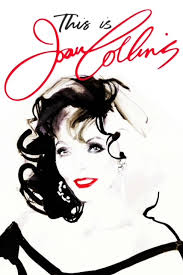
THIS IS JOAN COLLINS
UK, 2022, 96 minutes, Colour.
Directed by Clare Beavan.
This entertainingly comprehensive portrait of actress and celebrity, Joan Collins, was released in the year that she turned 89. She collaborated with the venture, appearing continually throughout the film, discussions about lighting and positions, reading a text, at the microphone, commenting, and some wry expressions and smiles about what she was viewing.
The film is informative on several levels. It provides an overall sketch of Joan Collins’ family, early upbringing and influences, training, moved to films, to Hollywood, marriages and divorces, relationships, ups and downs of her career, her children, American television, returning to the stage.
It also provides an overview of her career, her hopes and ambitions, training, the move to film in Britain, the invitation to Hollywood, the seven-year contract with 20th Century Fox, her early films like Land of the Pharaohs, Girl in the Red Velvet Swing, MGM, The Opposite Sex, lesser films, comment on actor she worked with, fairly derogatory on Richard Burton and Sea Wife, the diminishing of her film career, and the beginning of relationships with actors like Warren Beatty and break ups, and her regret for turning down the role in Sons and Lovers. There were her lean years, in television shows like The Virginian, horror films in England and The Empire of the Ants. And, then, dynasty and their identifying with Alexis Carrington, her popularity in the media, magazine covers and articles, television interviews. There was also her relationship with her sister, Jackie, in the background of filming The Stud and The Beach. And some details of her career, television and stage work in the 21st-century.
The film is very personal also on her relationships, her husband’s. With scenes from Maxwell reads films, there is the ugly story of date rape, her disillusionment, the marriage at 17, his wanting to prostitute her to an Arab millionaire, the divorce proceedings and his demand for alimony. There follows the marriage with Anthony newly, his growing celebrity at the time, that children, his deceiving her, the divorce, amicable. There is the marriage to the entrepreneur, Ray, a child, an affluent life and the discovery that it was built on deceptions, especially in finance. There is the surprise of the marriage to Peter home, the Swedish singer, his on-screen charm, and the realities of his persona in the real life of the marriage. Finally, there is a long time marriage to Clark Gibson, Collins finally setting and settling down.
The other aspect of interest in the film is in its portrait of Hollywood film making and the Hollywood culture from the 1950s to the 1990s, the glamour of the studios and contracts, the failing of the studios, the way prim celebrities were promoted and exploited, the emergence of television and its popularity. There is the life of the 50s, exploitations by producers like Darrell Zanuck, and Collins meeting with Marilyn Munro and her conversations, the covering up of relationships and harassment. Then there is a mood of the swinging 60s, the difficulties of the 1970s, the transition to television and television movies and exploitation films. Then, the 80s, the popular television series, the rivalry between Dallas and dynasty, the emergence of dynasty over nine years and its place in American consciousness, Joan Collins herself liking the 1980s and reminding audiences that it was the green decade, with reference to Gordon gecko and Wall Street.
There is quite an amount of material to be considered here, not necessarily in-depth exploration of some audiences might want, but an interesting and entertaining overview in just over 90 minutes.
Sinners
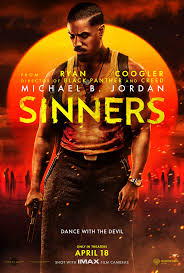
SINNERS
US, 2025, 137 minutes, Colour.
Michael B. Jordan, Miles Caton, Jack O'Connell, Helena Hua, Yao, Sam Malone, Delroy Lindo, Jayme Lawson, Hailee Steinfeld, Wunmi Mosaku, Omar Benson Miller, Buddy Guy.
Directed by Ryan Coogler.
To judge the sinners, it is important to know what the sins are. And, in this very striking and surprising drama by Ryan Coogler, there is quite a range of sinners.
Once upon a time, 2013, first time feature film director, Coogler, made a small budget film with Michael B. Jordan, Fruitvale Station. It focused on the police shooting of a young black man, highlighting racist issues, which received quite some critical acclaim. Coogler has collaborated with Jordan on the two spin-offs from Rocky, Creed, as well as two blockbusters in the Marvel Universe, Black Panther. Now he collaborates once again, big budget, long running time, with Jordan – twice.
Twice in the sense that Jordan here plays twins, two young men from a Mississippi town who went off to World War I, returned to prohibition Chicago, heavily involved in criminal activity, Sinners, to say the least. But, it is 1932, they return to their home town, buy an old mill from a racist owner, want to set up a jazz juke joint, especially for the African-American population of the town. And, this is what the first part of this film focuses on, the brothers, making all their contacts, hiring musicians, contracting friends to work, and the personal dramas from their past, past relationships.
While Jordan plays identical twins, the screenplay is something of a twins’ screenplay itself, to interrelated stories, but not identical twins. The second part of Sinners involves quite a different range of sins and sinners.
The film opens with the religious dimension, a talented young musician, Sam (a striking performance by Miles Caton) comes into his father’s church, the father is suspicious of the devil’s music, trying to reconcile with his son. And then the screenplay goes back 24 hours to the first part already described. With all the publicity, but a surprise to those who saw the film without warning, most audiences will now know that this is a vampire film, an Irish vampire (Jack O’Connell), roaming the West, pursued by Native Americans, but controlling and transforming the victims.
Then they converge on the mill, a siege, singing and dancing to Irish music, the contrast with the jazz at the mill, some eerie confrontations and conflicts, and an all-out battle with the vampires. And then back to the opening sequence of Sam at the church.
This is an original story, screenplay, full of the unexpected, but drawing on all kinds of movie traditions, jazz musicals, the vampire stories. Quite overwhelming in its way.
There is quite an important development set in the 1990s during the final credits which early exiters will regret that they have missed. And, further alert, right at the end of the credits there is a song sung by Sammy, calming and helping the audience to leave the cinema and reflect on what they have seen and felt.
- Sinners? The range of sins? The range of sinners? Victims of sinners, exploitation, vengeance, forgiveness…?
- The work of Ryan Coogler, his writing skills, his directing skills, African-American issues?
- The theme of twins, identical twins? The film’s twin themes of music and song, but not identical twins?
- The opening, traditions of music, supernatural elements, African, American cultures? Tone of the prologue, Sam, his injuries, guitar, entering the church, his father’s reaction, the choir, the congregation, his father’s warning, embrace, music and the influence of Satan, his father’s exhortation?
- The transition to 1932, Mississippi, the cotton fields, the town, African Americans, the slave heritage? The flashback for the one day, the action taking place over 25 hours? The audience immersion in the life of the Mississippi town?
- The twins, Michael B.Jordan’s performance as each, similar, contrast? The arrival back in town, the varying reactions of people, memories, their involvement in the war and this experience, later with Smoke and the weapons? The Chicago background, Al Capone, gangsters, taking the money, taking the Irish beer, the car, their ambitions, going to the mill, the encounter with the boss, his smile and dismissal of the Klan, paying the money? And the irony of later seeing the man, his white henchman, the racism, the attack, Smoke bringing out the weapons, the confrontation with the leader, asking for a smoke, shooting him? Sinners and judgement?
- The plan, the truck with the goods, meeting with Sam, Sam as a character, his age, skill with music, playing the guitar, singing, Stoke and’s admiration? In the town, meeting with Delta Slim, their playing together, the crowds? His gaze on Pearline, the conversation with her, married, invitation to the evening?
- Stack, his personality, relationship with Smoke, mutual protection, working together, the promotion of the venue? The encounter with Mary, the discussion, the relationship in the past, her passing for white, his awkwardness, the death of her mother, the burial?
- Smoke, going to the cotton fields, the encounter with Cornbread, his work, his pregnant wife, the money, going along with the group, pleased, being the bouncer?
- Smoke, visit to Anna, her personality, echoes of voodoo and beliefs, sexual relationship, the later memories by Smoke of the baby? Her agreeing to help?
- The Chinese, the store, the young Jessica, watching, her father and enthusiasm, his wife and her strong mindedness, the helping with the cooking?
- The crowds gathering, the music, the plan, Sam, Delta Slim and his enthusiasm, piano, mouth organ, Pearline and her performance? Zest, enthusiasm of the crowd?
- The introduction of the vampire theme, Remmic, his arrival, his fears, the couple and their reaction, letting him in, the arrival of the Indians, the warning about him and the violence? Vampire, their being transformed? The going to the dance, not allowed in, the plausible story, the Irish and white tradition, wanting to be part of the African-American experience? The confrontation at the door? The singing, then moving away?
- The vampire experience, Mary going out, the confrontation, possessed, going back, the sexual encounter with Stack, her attack on him? His response, Smoke’s response?
- The atmosphere of fear, the crowds, trying to escape, Cornbread and his going out in the field, confrontation, transformed, his return? The plausibility of those possessed, their talk, and their knowledge of everybody else’s life? Stack, his joining the group, coming back, trying to be persuasive, with Mary?
- The small group inside, the garlic, Chinese couple, the man going to get the car, transformed? The threat to their daughter?
- The plausibility of Remmic, his talk, songs, the couple and their backing him up?
- The attack, the fights, the stakes, destroying the vampires? Anna and her self-sacrifice? Delta Slim and his sacrifice?
- The sun coming up, Remmic and the others caught in the sunlight? Sam, the guitar, being urged to go back home?
- Smoke, getting the guns, lying in wait, the attack of the racists, the confrontation, shooting? His own wounds? Memories of Anna and the baby?
- Sam, his return to the church, the repeat of the opening, his decision, leaving, the religious perspective, the race perspective, the issue of freedom?
- The surprise interlude during the credits, 1992, Chicago, Sam as an old man, the visit from Mary and Stack, looking and sounding like the 1990s, the discussion with him, his singing, their offering to transform to live for eternity? His turning them down?
- In the post-credits sequence, Sam and his singing, the young Sam, his experiences on that day, but his life before him, the audience finishing this film with song and music?
Count of Monte Cristo/ 2025
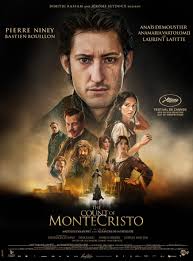
THE COUNT OF MONTE CRISTO
France, 2024, 178 minutes, Colour.
Pierre Niney, Bastien Bouillon, Anais Demoustier, Anamaria Vartolomei, Laurent Lafitte, Pierfrancesco Favino, Patrick Mille, Vasdsili Schneider, Julien De Saint Jean, Julie De Bona, Adele Simphal, Stephane Varupenne, Marie Narbonne, Bruno Raffaelli.
Directed by Alexandre de La Patellière, Matthieu Delaporte.
The novels of Alexandre Dumas have been very popular since the 1840s. French history – The Three Musketeers, the Man in the Iron Mask, The Count of Monte Cristo. And, they have provided a great deal of entertainment on the big screen and on the small screen. The Wikipedia entry on the novel lists 25 film versions all films, even in imaginary sequels, which derive from the plot and even more television versions.
The novel gets full attention in this version. It runs for almost 3 hours. And, it can be described as “lavishly-mounted” which covers the visual style of settings and sets, costumes and decor, 19th century atmosphere. And, this time, it is a French version, a national version of a national treasure.
Audiences remembering previous versions, this reviewer remembering Robert Donat, Richard Chamberlain, Jim Caviezel, the injustices that fall on the central hero, Edmund Dantes, especially, his imprisonment on the island, Chateau D’If, near Marseille. The long years that he spent isolated in prison, the tunnelling, his contact with Abbe, Faria the Abbe instructing him, bequeathing him the treasures of Monte Cristo, but no abating the sense of vengeance and revenge. And, then, his escape.
This time Edmond Dantes is played by French actor, Pierre Niney, who has been building a successful career in a variety of roles but who now successfully embodies the complexities of the Count of Monte Cristo. Interestingly, the role of the Abbe Faria is played by very popular Italian actor, Pierfrancesco Favino, most convincing in this role.
However, in this version, all this action takes place in the first hour. It was something of a surprise to find two hours spent on Edmond Dantes and his voyage to Monte Cristo, the treasure, his new identity, his place in the world and the response to this mystery celebrity. Even though the film is long, a lot of the action takes place off screen, the screenplay suddenly moving five years or more in advance, the audience having to fill in their response to the changes in the Count.
But, for the drama, his establishing himself, the long quest for revenge, his activities in the meantime, his international travels, his contacts, there is a huge supporting cast. There is the opening sequence of his rescue of the Napoleonic spy from the sea, his humble family background, the accusations against him, the betrayals. And these characters, years older, quite complex stories in their own right, become the targets of his plotting, manipulations, violent revenge, impoverishment of rivals, deaths.
And, as with the other versions, there are some swashbuckling sequences and swordfights. But, ultimately, the novel and the film versions do raise the perennial and important question from the Gospels, “what does it profit to gain the whole world but to lose one’s soul?”.
- The long popularity of the novel, the historical novels of Alexandre Dumas? The many film versions, television series, imaginative sequels, stories based on the plot – especially unjust imprisonment, escapes, vengeance?
- A lavish 21st-century production? Period, atmosphere, costumes and decor, buildings, mansions, interiors? Courts, jails, the Château d’If? Sequences at sea? The rescue? The isle of Monte Cristo? The treasures?
- The length of the film, audience emersion in the period, the characters and issues?
- The opening, the sea and the ships, in the sea, Dantes and his rescuing of the young woman, the reaction of the Captain, his anger? Meeting with the company owner, his dismissal of the captain, his promotion of Dantes, the identity of the woman, Napoleonic spy?
- Dantes, return home, reunion with his father, his father as a servant (and the later grief at the news of his father’s death), the aristocratic family, the conversation, his love for Mercedes, the friendship with Fernand? The wedding, the interruption, his being arrested, Mercedes lived at the altar?
- The interrogation, the role of the hill fort, the ship’s captain, the owner of the shipping company, Fernand, Danglars and his associate, listening in, Fernand giving up Dantes for the family’s name? Dantes taken away, the imprisonment?
- Four years passing, Dantes alone in his cell, the grating at the top, the roll call for “Living”? His suffering, the appearance? Stone moving, the contact with Abbe Faria? The tunnelling continuing, the discussions, Faria offering to teach Dantes everything, languages, maths, philosophy, history? 10 more years passing, the tunnelling, the saltwater, the collapse, the injuries to Faria, and his explanation of the Knights Templar, the treasures, the island of Monte Cristo? Faria dying, the preparations for his body to be thrown overboard? Dantes, substituting himself, the discovery of the empty cell, his being thrown into the sea, escaping from the canvas, swimming to safety?
- Monte Cristo, the steps, the mausoleum, opening it, the dark and the torch, the vast depths, the discovery of the treasure?
- The screenplay and the passing of time, months, years? The later dialogue filling in what happened to Dantes, his emergence as the Count of Monte Cristo? His buying the mansions, the setup and decor, affluence? His identity? (And his disguising himself as a priest and confronting Danglars’ associate, getting the truth from him, later appearing, to get absolution, and leading his band of thugs?)
- Dantes and his personality, the past experience, the imprisonment, his travels, and the news that Mercedes had married Fernand? A son? His bitterness, wanting vengeance, coldly calculating and planning?
- His finding the woman he rescued, her story about her brother, his mistress pregnant, the birth, de Villefort burying the baby, her rescuing it, bringing him up, going to the institution? Dantes and his visit, meeting Andre, taking him away, the years passing, his educating him, part of his plan? The revelation Andre about his father?
- Haydee, her story, the war, Dantes finding her, her father, the role of Fernand, losing his eye, but killing her father, her being part of Dantes’s plan?
- The stage robbery, Andre, being pursued by Albert, the thugs, Dantes and the rescue of the boy, restoring him to his family, their gratitude? And the assailants all getting up after their performance?
- Meeting Fernand, meeting Mercedes, his reaction, judging her for not waiting? Her suspicions of his identity? Their further meetings, tactics and wordplay? Ultimately, the revelation of the truth, her knowing who he was, her pleading for her son, her story about his loving him, his producing the document of Fernand’s betrayal?
- Danglar5s, his prosperity, fleet, slavery, organised human trafficking in Marseilles, his involvement, his marrying de Villefort’s mistress, their daughter? His self-confidence?
- The various socials, entertaining, Dantes and his being feted? The story of Lord Halifax, ultimately Dantes masking himself, literally, as Halifax, the interview with de Villefort? His psychological manoeuvres? The newspaper, Impartial, and the stories of Danglars’ fleet and disappearance, the reassurance, Danglars and his finance, confident of putting all his hopes in Dantes’s money?
- The romances, Albert and Haydee, Dantes forbidding it, yet their meeting, the romance? Andre, and his attentions to Danglars. daughter, and the fact that she was his half sister?
- Dinner, at the Château where Andre was born and buried? Dantes and his way of telling the story, the guests listening, and Danglars interested, the threat to de Villefort?
- In court, Andre and his previous masquerade as the Spanish count, credibility, rehearsing his lines with Dantes? Exposing the truth, the exposure of his father? And his later arrest? Danglars and the realisation of the truth, Dantes and his self-revelation?
- Albert, his love for Haydee, her love for him, urging him to go? Defying Dantes, the glove, the duel? Mercedes and her pleading for her son? The duel, Dantes shooting away? His return, Haydee and her upset, denouncing him, her love for Albert, his being in the coach, emerging, Dantes urging them to run away to their future?
- The confrontation with Fernand, the duel, swords and knives, injuries, Dantes and his surviving? Mercedes and her leaving her husband?
- The moral issues, the issue of the innocent victim, punishment, torture? The transition to vengeance, literally gaining the whole world, Dantes losing his soul, the possibility of forgiveness, and the final words of:
Wilding
WILDING
UK, 2023, 75 minutes, Colour.
Directed by David Allen.
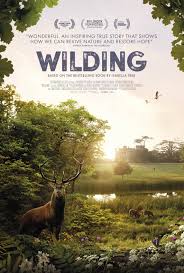
To complement David Attenborough's Ocean, there is another British documentary, Wilding, which is solidly land and Earth-based. It is based on a book by Isabella Tree, an environmental story, an experiment, over more than 15 years in south-eastern England. While there is some footage of the actual environmentalists, actors portray the couple in the present, presenting a first-person commentary on the Wilding, re-Wilding of their property.
The film focuses on a couple inheriting a country estate, practically a castle, and wider grounds. However, they discover the earth is tired, making the point that when soil loses its nutrients, it becomes merely, dirt. With reference to a number of experimenters on revitalising earth and soil, they begin an experiment, with some hostile reactions from neighbours, with slow evaluation and cooperation by government authorities.
The advice they receive is to introduce some wild horses, other animals, revitalising the life of trees, waterways (especially with extraordinary beavers), over long years with hopes and disappointments, the revitalising of flora and fauna, the return of so many animals and birds, returning landscapes to what they were like hundred years ago. It is visually exciting as well as encouraging.
Until Dawn
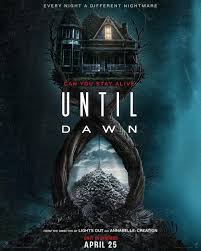
UNTIL DAWN
US, 2025, 103 minutes, Colour.
Ella Ruben, Michael Cimino, Odessa A'zion, Ji-young Yoo, Belmont Cameli, Maia Mitchell, Peter Storemare..
Directed by David F.Sandberg.
An often grim and gory horror film. Audiences watching this film will be reminded of Groundhog Day, except that this is a Groundhog Night story, repetition after repetition, but starting at night, the audience seeing an hourglass, the sand running through, then starting anew.
But, the idea here is that a character goes to sleep and wakes up the next morning. This time, however, the characters die, often brutally, sometimes in pieces, smashed, but, there they are, starting again each night.
In fact, the film begins with a young woman, night, crawling through the grass, trying to escape a vengeful pursuer – but failing, executed. Her sister, depressed, some suicide attempts, gathers her friends together to find and rescue her disappeared sister. On the way, they meet the storekeeper in the isolated town who gives them directions, their driving through a mysterious mist, exiting to find an old mansion – and the film does give an explanation of how this mysterious place came to be.
Enjoyment of the film will depend on how well the audience relates to each of the characters, sometimes sympathetic, often irritating, and even more frequently behaving erratically. No wonder, because they know are each night they are going to die again, trying to prevent it and failing, clashes with each other…
Until Dawn is a PlayStation production, the film version of a popular computer game. And, in computer games, every setting is possible, rapid change of settings possible, living, dying, living again are all possible parts of the game. So, not to be taken too literally, and, of course, expecting the unexpected as the players try to defy the odds.
There is a revelation as to who is behind all the mayhem, a mad psychologist who appears finally, and a challenge then for the group, or survivors, at least, to confront him.
A horror film for those who like to observe – game-players would prefer to be actually playing rather than watching.
(The director, and David F.Sandberg, is Swedish that has made a number of American films, one of the Annabelle thrillers as well as the two Shazam films.)
Inside Man: Most Wanted
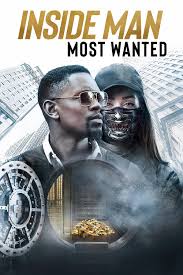
INSIDE MAN: MOST WANTED
US, 2019, 105 minutes, Colour.
Aml Ameen, Rhea Seehorn, Roxanne McKee, Akshay Kumar, Andre Jacobs.
Directed by M.J.Bassett.
Inside Man was a very successful thriller in 1996, directed, unexpectedly, because of his social comedies and critiques, by Spike Lee. And it had a star cast, a very clever screenplay, the bank robbery, negotiations, and sleight of hand in deceptions.
This film takes up the same story, with particular references to the original characters, a photo of Denzel Washington, some of Clive Owen, the Nazi gold, robberies, planning, deceptions. The film is a star vehicle for British actor, Aml Ameen, and for Rhea Seehorn (from Better Call Saul). They are the two negotiators odd couple, she very serious, he with continual patter, when the Federal Reserve is being robbed, the Nazi gold, and complex motivation is.
The film as enjoyable as a heist film even without reference to the original film (many bloggers finding this sequel an insult to their revered original).
Direction is by M.J.Bassett, English director. She moved to the US and directed a number of films and television series.
- The status of the original? This film is sequel, references to the original robbery, negotiation, planning and success? A repeat of the process?
- The prologue, World War II, the Americans, the discovery of the Nazi gold? Audience knowledge of the gold and the robbery from the previous film?
- The New York settings, the city, police precincts, the University lecturer, the Federal Reserve, the interiors, the gold? The surveillance? The musical score?
- Remi, in action, the patient at the hospital, sweet-talking him, success? His record? Breezy character, talking, New Orleans background?
- Brynn, her lecture, the students, the interruption, task? Her principles, saving hostages? The authorities, issue of promotion? And she has her assistant, research?
- The focus on Arielle, to the bank, the planting of the team, the customers, the takeover, the guns, letting the staff go, the hostages, putting on red gear and masks, indistinguishable? The plan, her command, the gold, military, the bars like brass, the drilling for the escape, Joseph, his brutality, killings? Josie and her assisting Arielle? The later revelation of the motivation, the connection with the original film, her brother and the planning, his being captured, killed? The sister as student in New York, her relationship with Bobby, giving the information, the underground, her pretending to be beaten, her disappearance?
- Brynn, Remi, together, becoming a team, the staff, technology, surveillance, the phones? The different personalities, working together? The contact from Arielle, wanting Brynn? The conversations, the water and the hostages getting it, Jimmy and his patter, discerning the story, interpreting Arielle? Brynn, the hostages, her decision to go in, in the cage, the conversation with Arielle?
- The plan, the timing, the threats, the arguments, the plane and the vehicles, the escape plan? Drilling through the wall? Joseph killing the driller?
- The SWAT team, the attack without authorisation, being rejected? Their being ready, snipers?
- The character of Sam, the police, collaboration with the Ruby?
- The explosions, the water coming in, Arielle under the water, then on the roof, Joseph being trapped, getting out, the attack on bringing, Remi and the rescue? Her getting out?
- The cleaning up, the realisation that the gold was turned into bars, the information about the contents of the draw in the bank, Hamlet, Ava’s disappearance?
- The setup, the background of the neo-Nazis, the club in Berlin, Chase, her brother as prisoner, the rendezvous with Brynn? The discussions, the arguments, the arrival of the police, her success, at first refuse promotion, possible promotion? And going off for a coffee with Remi?
- The finale, Arielle, going to the club in Berlin…?
Dad Quest, The/ Lo megor del mundo
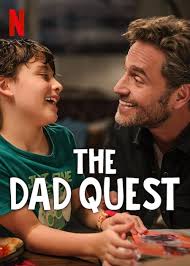
THE DAD QUEST/ LO MEJOR DEL MUNDO
Mexico, 2025, 83 minutes, Colour.
Michel Brown, Martino Leonardi, Mayra Hermosillo.
Directed by Salvador Espinosa.
The Dad Quest is a brief Mexican comedy drama, focus on the 10 year old, Benito, Martino Leonardi in his sole film appearance, his relationship with his mother, his father divorced, staying with his grandmother. Then it emerges that Gallo, his divorced father, is not his biological father.
Gallo and Benito go on a quest, bonding, searching his deceased mother’s phone for connections as to who is his biological father, a visit to an artist, a gym instructor, a television personality, getting information from a psychologist. The two are joined in the search of their mother’s friend, Diana.
There seems to be a happy solution with the boss of the agency for which Benito’s mother worked. They bond nicely but audiences are not sure whether he is the actual biological father. He warmly welcomes Benito. However, with the experience of travelling with Gallo, Benito and Diana run after Gallo as he leaves.
A caring foster father offers more support than an unknown or discovered biological parent.
- The title? Father-son relationships, biological, care?
- The Mexican setting, homes, outings, the encounters with potential fathers? The musical score?
- The introduction to Gallo, the airport, relationship with Alicia, the meal together, the background of the divorce, Benito, aged 10, custody, visits? Her exasperation, suggestion he was not the biological father, her exit, the accident, her death, the funeral?
- Gallo, the television work, his personality, working with his boss, the TV sequences? Memories of Alicia? Distant relationship with Benito? The encounters with Alicia’s mother, Benito staying with her, her idiosyncratic behaviour, the injury to the lizard…?
- Benito, aged 10, relationship with his mother, with Gallo? The alienation? The issue of his mother’s death, staying with his grandmother, his awareness of the situation, direct talk? His wanting to find his biological father?
- Gallo, the DNA test and the results? Talking with Benito? Benito and his mother’s phone, the candidates for his paternity? The quest? Going to the artist, the many portraits of Alicia, her pregnancy, and the later gift as asking for forgiveness? TV star, the clash with Gallo, non-admittance? The trainer, his work with Alicia and her program, the dance, inviting Benito to start child classes?
- Gallo preoccupied, his boss, the change of set, her following him, his decision to go to Miami for a job? Changing his mind in staying?
- The visit to the psychologist, Gallo and his threats, the information? The visit to the agent, his happy memories of Alicia? Possibly the father?
- Diana, her friendship with Gallo, going on the search, her interventions, support?
- Gallo and his leaving, the emotional ties to Benito after the event, the walkie-talkie Communications, sharing the meals, the visits, the journey? Benito embracing the agent, the agent and his wife and daughter, Benito and Diana hurrying to join Gallo?
- The significance of biological paternity, identity, the foster father? The future?
Sniper: G.R.I.T.: Global Response & Intelligence Team
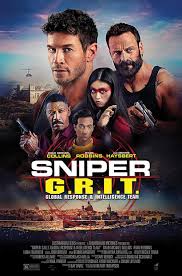
SNIPER: G.R.I.T., GLOBAL RESPONSE & INTELLIGENCE TEAM
US, 2023, 93 minutes, Colour.
Chad Michael Collins, Ryan Robbins, Luna Fujimoto, Dennis Hayesbert, Josh Brener, Matthew Sim.
Directed by Oliver Thompson.
There have been 10 and more Sniper films following the original in 1992 starring Tom Berenger – who appeared in a number of the later films. However, the later films focus on his son, Brandon, played by Chad Michael Collins. There are variations on the theme, Brandon is the Sniper, his collaborator Zero (Ryan Robbins) skilled in setting up situations. Their boss in several films is played by Dennis Hayesbert. Introduced in one episode is Lady Death, a Japanese assassin who continued in other films – this time, her being captured and the need for her rescue as well as an origin story of her becoming an assassin, the sinister presence of her father.
A lot of action, a high body count, the value of the settings in Malta. But, instead of the straight out serious tone, there is the atmosphere of a buddy movie, and often a tongue-in-cheek attitude towards the characters and events, some sardonic humour.
- The continued popularity of the Sniper franchise, 30 years.
- Audience knowledge of the central characters, their history, the previous films, their characters, action, capabilities? The situation of the capture of and the need for rescue?
- The introduction to Brandon and Zero, their characters, humour, their work together, Sniper, setting up situations? Humour? Gabriel Stone as their boss, summoning them, the situation?
- Malta, the visualising of the cult, Bubalo as the leader of the cult, his style, the crowds worshipping him, in green, sitting in assembly, his meal, the failure of mission and the death at the table? The group and their personalities, tasks, as explained by Gabriel Stone?
- The settings in Malta, landscapes, cities, the sea? The compound?
- The mission, Zero and his infiltration, disguise, not speaking the language, repeating phrases, persuading the members of the group to go to the roof? Brandon, Sniper, the set-ups, the various shops, Bubalo and his emerging, satisfaction, his death, everybody rushing away?
- The confrontation with the doctor, and her explanation that he saved her? His helping with the escape, hiding, Lady Death and her being shot, his tending her wounds?
- The suspicious behaviour of the doctor, Zero following him, the discovery of the truth, confrontation? The doctor and his contacts with Prince Caspian, the meetings, the deals, Communications?
- The background of Prince Caspian, the story of Lady Death, her adoption, the kindly father, the gangster, his training her to be an assassin, her success, her breaking away, his wanting her back, the deals?
- The tracking, the hired assassin, the group’s attacks on him, his being wounded? Waiting for him to arrive, the realisation of the tracking device, opening up her wounds and retrieving it, the new set up, into the trap?
- Prince Caspian, his contacts, coming to the compound? Zero, his contacts and getting information, connecting to computers, Intelligence Pete’s personality, Gabriel Stone seconding him, the flight, arriving, using the computer for infiltration and surveillance? Zero and Brandon, the confrontation between Prince Caspian and his daughter? The irony of Intelligence Pete bringing him down? Survivng and brought to trial?
- Mission accomplished, audiences enjoying all the action sequences, the large body count…? The sense of humour in the screenplay, sometimes sardonic, a different tone to it straight action film?
Head Count
HEAD COUNT
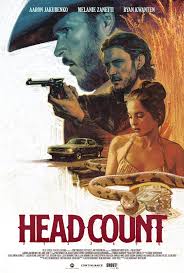 US, 2023, 180 minutes, Colour.
US, 2023, 180 minutes, Colour.
Aaron Jakubenko, Ryan Kwanten, Kyle Dyke, Melanie Zanetti, Polaris Banks.
Directed by Jacob Burgardt, Ben Burgardt.
This is a first feature film of brothers, Jacob and Ben Burgardt. They have made a number of short films. Here they shall arise sense of humour, a number of viewers making a link with the films of the Coen brothers make Blood Simple and Fargo. Another American film worth viewing as a companion to Head Count is Greedy People.
The framework of the film is the central character, Kat, with the gun to his head, and his going back over his recent experiences to calculate how many bullets there are left in the gun. In the film goes back, first to his digging with the chain gang in prison, an attack by feral animals and his escape in the police car. There follow quite a number of episodes, always with the counting of the bullets, and many of them reminiscent, but with sudden and humorous twists – Kat in the wrong house and having to hide under the bed, a couple coming for an affair and the lover also hiding under the bed, an episode where Kat has to find money in an arms dealer’s house with the information that it is behind a picture of Jesus Christ – and the sudden turn of the camera to find so many pictures of Jesus on the wall…
There are flashbacks to Kat’s past, his relationship with Josephine, and then his further escape, meeting up with his sympathetic brother, with Josephine, encountering her current boyfriend.
A number of bloggers have not liked the film because they were taking it very seriously and finding it inconsistent – not realising the ironic and humorous tone.
- The tone of the film, serious and realistic? Ironic and stylised? Serious? Comic?
- The title, the reference to the gun, the bullets, Kat counting them, assessing his chances of survival?
- The American setting, the prison fields in Kansas, on the road, service stations, homes, clubs, gun dealers? The narrative, the framework with the gun at Kat’s head, the flashbacks with Jo, the flashbacks with the gambling and the disposal of the body? The overall effect in 80 minutes?
- The present situation, the chain gang, the gardens, attitudes, especially Sawyer, the animals approach, dragging away the prisoners, Sawyer shooting the chain, Kat running, driving away? A serious and comic prologue with the animal attack?
- Kat, his age, finding out something of his background, relationship with Jo, her coming to the bar, his approach, his disappearance, prison? At the service station, affirmed by the rancher, taking his lunch? Going to the house, the comedy of the couple coming, his hiding under the bed, the husband arriving, the lover under the bed, his pulling the gun, the threats, escaping with the lover? The farcical enjoyment of this scene?
- Going to the bar, the encounter with Jo, dancing, her boyfriend and his watching? Kat and his brother, his brother and the casino gigs, the bond between them, helping him, the clothes?
- Sawyer in the bar, seeing him, the fight, Sawyer and his deal, Vince and the guns, the money behind the picture of Jesus, the sudden humour of so many pictures on the wall, Kat and his request for guns, Vince and his easy-going, finding the money, Mason arriving for his money, Kat, in the bathroom, the snake in the bath, escape from the window, the shootouts? Sawyer and the money, letting him go?
- Preparing to go to get away, Seattle and Alaska, the arrival of Cassidy, the injury to the eye, Kat’s foot, the arrival of Flint, the truth, the army, brutality, Flint sick of hearing all about Kat for three years…?
- The final fights, the guns, counting the bullets? The shock of the death of Kat’s brother?
- The overall effect, a laugh thriller, ironic, and the echoes of the Coen brothers?